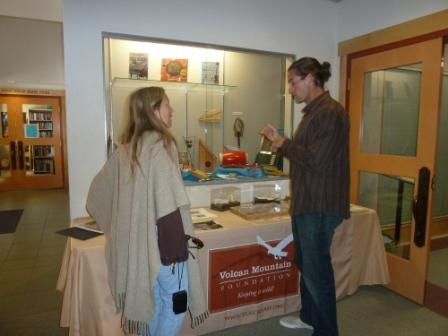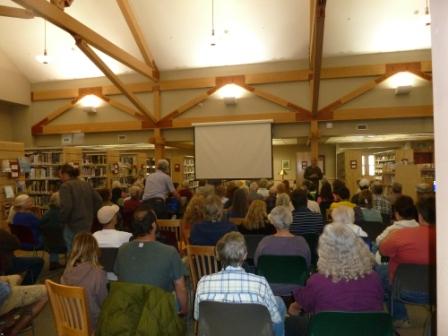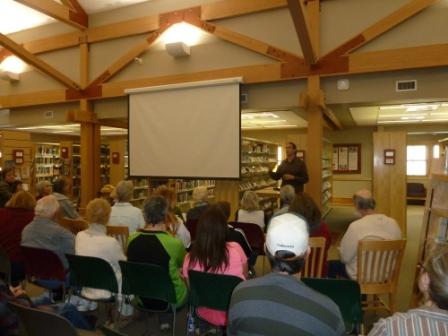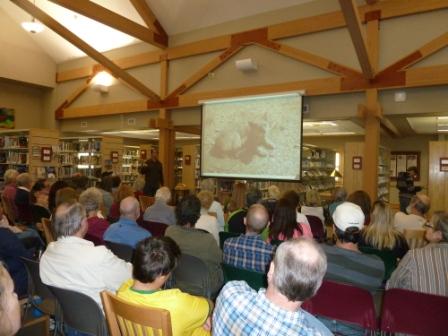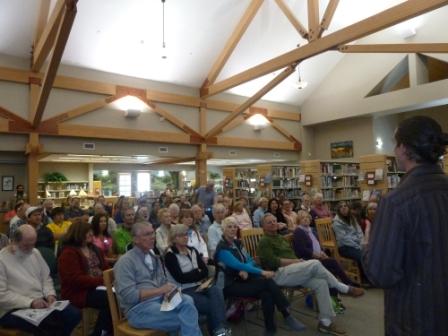Lions and Research and Volcan….Oh My!
Mountain lions ruled the day at a special ‘Creatures of the Mountain’ presentation at the Julian Library on January 17th. The well-attended event drew about 80 life-long learners to listen to, biologist and tracker, Mike Puzzo discuss wildlife on Volcan Mountain and in the broader Southern/Baja California region.
Thanks to Volcan Mountain Foundation (VMF) Education Coordinator, Kathleen Beck, and Julian Branch Librarian, Colleen Baker for arranging the informative and fascinating presentation which primarily focused on Puzzo’s work with other regional mountain lion researchers.
Puzzo is an Environmental Scientist with State Parks, primarily conducting research with Big Horn sheep in Anza-Borrego Desert State Park, as well as on mountain lions in Cuyamaca Rancho State Park (CRSP). He also has a long history with the San Diego Tracking Team working on projects ranging from the Puma Project to badger surveys, like the USGS is conducting near the summit of the Volcan Mountain Wilderness Preserve.
Wow! A lot of people really care about protecting the majestic mountain lions and other creatures that call the 15-mile long Volcan Mountain range home!
He noted that VMF has helped to preserve roughly 48 square miles of the Volcan Mountain range, compared with roughly 39 square miles which CRSP encompasses. Based upon his research in the Cuyamacas, which supports 6-8 mountain lions, he estimates that the Volcan Mountain range, “probably supports about 6-8 lions that utilize a portion of VMF properties as part of their home range.”
Although not everyone can be a wildlife researcher, Puzzo wants everyday citizens to know that they have a role in protecting these incredible animals, “Research drives the other three processes of wildlife and habitat protection—Education, Land Conservation, and Legislation.”
Here are Puzzo’s notes for how you can help:
- Avoid Use of Rodenticides: Unfortunately, they’re used everywhere. A dead female lion was found on one of the farms in Borrego Springs near Coyote Canyon and mountain lions in the Cuyamacas have tested positive for different rodenticides. Wildlife on Volcan Mountain is in such close proximity to the wildlands of Volcan Mountain, that creatures farther up the food chain suffer the consequences.
- Practice Responsible Animal Husbandry to Protect Domestic Animals & Livestock: Unless you maintain a large herd of livestock, it is recommended to keep domestic animals in completely enclosed, secure pens with a roof and floor. Doing so helps to:
- reduce requests for depredation permits— lethal removal of a wild animal that has attacked a domestic animal is the number one way male mountain lions, particularly young male mountain lions, die in SD county
- to increase the longevity of mountain lions in SD county
- potentially provide the necessary influx of genetics into the population of lions in the genetically isolated Santa Ana Mountains
- reduce disease transfer which can occur between domestic cats, bobcats and mountain lions
- Support Conservation Organizations: Most importantly, the work of organizations such as the Volcan Mountain Foundation, and partners like the San Dieguito River Valley Conservancy, Anza-Borrego Foundation, and The Nature Conservancy, is critical for education, advocacy, habitat conservation and, in turn, wildlife protection.
Be a Citizen Scientist Researcher With WIT
You can also be a citizen scientist researcher by volunteering with VMF’s new WIT—Wildlife Imaging Team. The Wildlife Imaging Team is an eager group of volunteer citizen scientists that are helping to establish baseline wildlife surveys on VMF property alongside conservation biology research students of Dr. Mike Mooring from Point Loma Nazarene University. To volunteer, contact VMF Education Coordinator, Kathleen Beck at 760-518-3273 or VMFEducation@VolcanMt.org.
For updates on this, and other, citizen science projects, be sure to make regular visits to VMF’s website, www.VolcanMt.org, and Facebook page, www.facebook.com/volcanmountainfoundation.
Want to learn more? Here are a few links that Puzzo suggests:
Wildlife Health Center at UC Davis—has great videos: http://www.evotis.org/mountain-lions
Research that the National Park Service and UCLA have done on mountain lions in the Santa Monica Mountains: http://www.urbancarnivores.com
Research from Colorado and California that discusses disease transfer between domestic cats, bobcats and mountain lions: http://www.nsf.gov/news/news_summ.jsp?cntn_id=123011
Another link to research in Colorado and California about diseases in domestic cats, bobcats and mountain lions: http://journals.plos.org/plosone/article?id=10.1371/journal.pone.0031403
